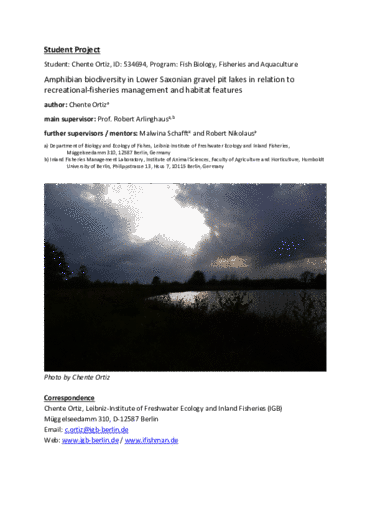Amphibian biodiversity is declining globally, marked, among other processes, by changes in habitat features. Management of freshwater by recreational fisheries can alter the habitat of aquatic systems and have negative impacts on amphibian communities, i.e., fisheries stocking. However, the potential impact of recreational fisheries management is unclear, as various factors, many of which unrelated to fisheries management (e.g., agriculture), can contribute to the overall impact on amphibian biodiversity. Our project studied the ecological influence of recreational fisheries, as well as environmental factors on amphibian biodiversity and community structure in gravel pit lakes. We sampled 38 lakes in Lower Saxony, Germany, providing estimates of amphibian biodiversity and measures of habitat features. Lakes differed in management bodies (i.e. angler-managed vs. non-angler-managed). Results varied between management types: angler-managed lakes showed lower species richness than non-angler-managed ones. However, amphibian biodiversity was generally low, independent of management type. Fish biomass estimates were similar across lakes, suggesting similar predation rates between management types. Multivariate analyses identified the extent of shallow water (percentage of depth < 3 m) as a potential driver for amphibian biodiversity. We conclude that, while such lakes may support a wide variety of freshwater biodiversity, the effective conservation of amphibian biodiversity necessitates community-specific management and we suggest focusing efforts on vernal pools and other such fish-free wetlands.
Amphibian biodiversity in Lower Saxonian gravel pit lakes in relation to recreational-fisheries management and habitat features
Projekt Baggersee , Studie

Ortiz, C. (2020). Amphibian biodiversity in Lower Saxonian gravel pit lakes in relation to recreational-fisheries management and habitat features. Studienprojekt, Humboldt-Universität zu Berlin
Veröffentlicht
: 2020
Erschienen in
: Studienprojekt, Humboldt-Universität zu Berlin
